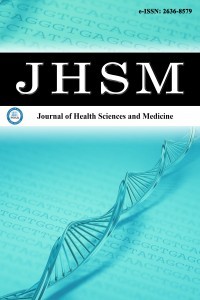Knowledge and attitude of physicians for the diagnosis and management of obstructive sleep apnea
Introduction: Obstructive sleep apnea (OSA) is a disease characterized by recurrent complete (apnea) or partial (hypopnea) upper respiratory tract obstructions episodes during sleep and often a decrease in blood oxygen saturation. The knowledge and attitude of physicians about OSA is very important as it influences the level of clinical suspicion of OSA which can lead to diagnose. Therefore, aim of this study was to evaluate the knowledge of and attitude to OSA of physicians.
Material and Method: This descriptive, cross-sectional survey study included 105 physicians in a university hospital. Participants completed the Obstructive Sleep Apnea Knowledge and Attitudes (OSAKA) questionnaire through the face-to-face interview method.
Results:The study respondents comprised 55 (52.8%) males and 50 (47.6%) females with a mean age of 34.4±7.3 years (range, 23-59 years). The years of experience was mean 10.45±7.37 years (range, 1–35 years). The knowledge level of physicians was mean score of 11.56±2.70 (64.1%). Attitude section, the mean score was 16.34±2.47 from a possible maximum of 25. A positive correlation was determined between the knowledge and the attitude scores of the physicians (r: 0.467 p
Keywords:
Knowledge, Attitude, Physicians, obstructive sleep apnea,
___
- Roeder M, Sievi NA, Kohler M, Schwarz EI. Predictors of changes in subjective daytime sleepiness in response to CPAP therapy withdrawal in OSA: A post-hoc analysis. J Sleep Res 2021; 30: e13078.
- Meszaros M, Tarnoki AD, Tarnoki DL, et al. Obstructive sleep apnea and hypertriglyceridaemia share common genetic background: Results of a twin study. J Sleep Res 2020; 29: e12979.
- Flegal KM, Carroll MD, Ogden CL, Johnson CL. Prevalence and trends in obesity among US adults. JAMA 2002; 288: 1723–7.
- Alaçam Z, Pekcan S, Akdağ B, Şenol H. The Relationship of hemogram parameters and night desaturation in patients diagnosed with obstructive sleep apnea syndrome. J Turk Sleep Med 2018; 5: 62-6.
- Dursunoglu D, Dursunoglu N. Cardiovascular diseases in obstructive sleep apnea. Tuberk Toraks 2006; 54: 382–96.
- Zhang RH, Zhao W, Shu LP, et al. Obstructive sleep apnea is associated with coronary microvascular dysfunction: A systematic review from a clinical perspective. J Sleep Res 2020; 29: e13046.
- Alvarez-Sabín J, Romero O, Delgado P, et al. Obstructive sleep apnea and silent cerebral infarction in hypertensive individuals. J Sleep Res 2018; 27: 232-9.
- Floras JS. Hypertension and sleep apnea. Can J Cardiol 2015; 31: 889-97.
- Turkington PM, Sircar M, Allgar V, Elliott MW. Relationship between obstructive sleep apnoea, driving simulator performance, and risk of road traffic accidents. Thorax 2001; 56: 800-5.
- Escourrou P, Grote L, Penzel T, et al. ESADA Study Group. The diagnostic method has a strong influence on classification of obstructive sleep apnea. J Sleep Res 2015; 24: 730-8.
- Young T, Evans L, Finn L, Palta M. Estimation of the clinically diagnosed proportion of sleep apnea syndrome in middle-aged men and women. Sleep 1997; 20: 705-6.
- Senaratna CV, Perret JL, Lodge CJ, et al. Prevalence of obstructive sleep apnea in the general population: A systematic review. Sleep Med Rev 2017; 34: 70-81.
- Young T, Palta M, Dempsey J, Skatrud J, Weber S, Badr S. The occurrence of sleep-disordered breathing among middle-aged adults. N Engl J Med 1993; 29; 328: 1230-5.
- Solanki SL, Karan N, Parab SY. Obstructive sleep apnoea and its knowledge and attitude among Indian anaesthesiolgists - A survey study. Indian J Anaesth 2019; 63: 648-52.
- Ozoh OB, Iwuala SO, Desalu OO, Ojo OO, Okubadejo NU. An assessment of the knowledge and attitudes of graduating medical students in Lagos, Nigeria, regarding obstructive sleep apnea. Ann Am Thorac Soc 2015; 12: 1358-63.
- Al-Khafaji H, Bilgay IB, Tamim H, Hoteit R, Assaf G. Knowledge and attitude of primary care physicians towards obstructive sleep apnea in the Middle East and North Africa Region. Sleep Breath 2021; 25: 579-85.
- Southwell C, Moallem M, Auckley D. Cardiologist's knowledge and attitudes about obstructive sleep apnea: a survey study. Sleep Breath 2008; 12: 295-302.
- Schotland HM, Jeffe DB. Development of the obstructive sleep apnea knowledge and attitudes (OSAKA) questionnaire. Sleep Med 2003; 4: 443-50. Erratum in: Sleep Med 2008; 9: 705.
- Çelik, M. An assessment of the knowledge and attitudes of medical students about obstructive sleep apnea syndrome via obstructive sleep apnea knowledge and attitudes questionnaire. KBB Uygulamaları 2020; 8: 89-96.
- Guillemin F, Bombardier C, Beaton D. Cross-cultural adaptation of health-related quality of life measures: literature review and proposed guidelines. J Clin Epidemiol 1993; 46: 1417-32.
- Wang CL, Li XZ, Cai XL, Pan XL, Min J. Anesthesiologist's knowledge and attitude about obstructive sleep Apnea: a survey study. Sleep Breath 2012; 16: 41-6.
- Corso RM, Sorbello M, Buccioli M, et al. G. Survey of knowledge and attitudes about obstructive sleep apnoea among Italian anaesthetists. Turk J Anaesthesiol Reanim 2017; 45: 146-52.
- Devaraj NK. Knowledge, attitude, and practice regarding obstructive sleep apnea among primary care physicians. Sleep Breath 2020; 24: 1581-90.
- Ozoh OB, Iwuala SO, Desalu OO, Ojo OO, Okubadejo NU. An assessment of the knowledge and attitudes of graduating medical students in Lagos, Nigeria, regarding obstructive sleep apnea. Ann Am Thorac Soc 2015; 12: 1358-63.
- Cherrez Ojeda I, Jeffe DB, Guerrero T, et al. Attitudes and knowledge about obstructive sleep apnea among Latin American primary care physicians. Sleep Med 2013; 14: 973-7.
- Yayın Aralığı: Yılda 6 Sayı
- Başlangıç: 2018
- Yayıncı: MediHealth Academy Yayıncılık
Sayıdaki Diğer Makaleler
Songül KESKİN KAVAK, Nebahat SEZER, Lale AKTEKİN
The role of ECG as a mortality predictor in COVID-19 patients treated in the intensive care unit
Şadiye ALTUNTUZCU, Fatih GUZEL, Ali UYAR, İhsan KAPLAN, Yunus GÜZEL, Bekir TAŞDEMİR, Kendal YALÇIN
Engin KARAGOZ, Muhammed KİZİLGUL
Tuğçe ŞAHİN ÖZDEMİREL, Esma Sevil AKKURT, Özlem ERTAN, Mehmet Enes GÖKLER, Berna AKINCI ÖZYÜREK
Mehmet DEMİR, İsmail YAĞMUR, Eyyup Sabri PELİT, Bülent KATI, İbrahim Halil ALBAYRAK, Halil ÇİFTÇİ
Neutrophil-to-lymphocyte ratio in patients with white-coat hypertension
